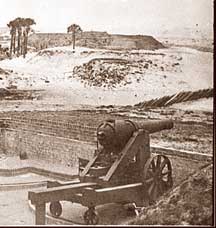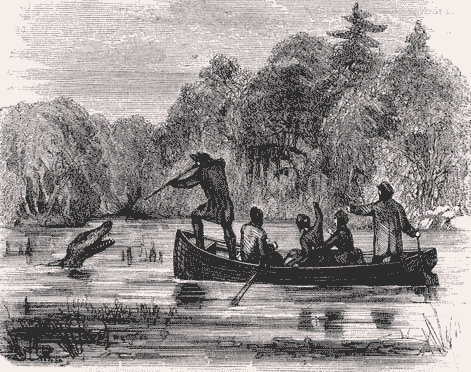

|
|
 |
Milo Grow's Letters fromThe Battle of Charleston |
![]()
Ranicowles Coleton Dist-S.C., May 24, 1862
[James Island, near Charleston, S.C.]. June 20, 1862
[Date unknown, after June 16th]
| Your spirit is certainly much superior, more heroic than that of many who trifle away their time and pine because their husbands are in the war--waiting for charity and the county to support them. Your conduct is worthy of you and me as well as fitting the times. You know very well that I do not believe in a life of inactivity for any rich or poor. |
|
Canon defending Ft. Moultrie, Charleston.
(Library of Congress) |
 |
| Our officers are in a worse condition that the men. They have to support themselves at a heavy cost and have never got a dollar from the government yet. They have borrowed all the money from the men they could get. There will be mutiny among them if they are not paid soon. |
 |
A scene from life in the South, as imagined in the Northern press (Harper's Weekly, 1859) |
| A soldier gives up every conceivable liberty. John Sheffield went home without leave-- or in other words is what military law calls a deserter. He will probably be punished. Cashiered at least, that is deprived of his office. It would be well not to mention what I say about him. He has treated me kindly and I do not wish to interfere in his acts. He in his ignorance cursed the government and everything connected with it. I am fully sick of the manner in which the government is administered through it is useless to speak more of it. |
|
As Williams relates in Rich Man's War, another Confederate soldier wrote home that it was "an everyday occurrence for men to get letters from home stating that their families are on the point of starvation. Many a poor soldier has deserted and gone home in answer to that appeal, to be brought back and shot for desertion." (128) |
Dearest One I sit down this evening to have a little chat with you on paper through I cannot tell whether I shall have time, as orders come so frequently that we cannot say the next minute is our own. We were up nearly all night last night and standing on the color line in front of our camp to be ready is case an attack is made. We are up two or three nights in a week, though I do not stand regular guard. The Captain has relieved me from that in consideration of my doing the writing for the company. I received a long and very affectionate letter from you by mail a few days since. I have carried it in my pocket ever since and read it twenty times. I see others tear up the letters received form their wives, saying they do not wish the Yankees to get them in case they should be taken prisoners or should fall on the field. But I always have one or two of yours with me, not anticipating such a contingency. I have stood on picket guard two nights within half a mile of the enemy's camp, so near that some of our boys said they could hear the word of command uttered by them, and both times I had your letters with me. I did not anticipate being taken or shot but I knew there was danger enough to keep me on the alert. I watched all night and should have made the best fight possible if they had shown themselves. Your affectionate words are so sweet to me and I long to be with you and have you for my Lyra once more. You shall be my bride once more, and I think it will be more pleasant than at first, not having so many restraints. It is as uncertain when I can return as the wind. We have to get the signature of the Capt., Col., and two superior officers to even go to Charleston. 4 miles. and I have not been since I have been here. though I have tried. If I could get sick and remain so a while I could go home on sick furlough. A soldier gives up every conceivable liberty. John Sheffield went home without leave-- or in other words is what military law calls a deserter. He will probably be punished. Cashiered at least, that is deprived of his office. It would be well not to mention what I say about him. He has treated me kindly and I do not wish to interfere in his acts. He in his ignorance cursed the government and everything connected with it. I am fully sick of the manner in which the government is administered through it is useless to speak more of it. I am very sorry to learn of your bad cough and sickness. I am anxious to hear how you are. I sympathize with Zoueri in her affliction. I hope she is well before now. Your thread is very good. I am afraid you are undertaking too much and will come down sick. I could not come home if my going would save your life and our superior officers knew it. I do not believe that military law is executed so vigorously any where in the world as in S. C. Such tyranny gets up a spirit of rebellion in me. I could not even be allowed to state may case to the Gen. I could not even speak to him though he might come up into our camp. Capt. H. will do all that lies in his power though he is nearly powerless. Col. Slaughter could do more if he would. I was glad to hear from the cows and all the things. And especially leettle Lee. I am very anxious to see him and hear him Hurrah for the soldiers and Generals. I send you by Mr. McMullen a knife picked up on the battle field which you can use as a butter knife. It belonged to S.C. Spence of the 8 Michigan Regiment. It will be a memento or sort of a curiosity of the battlefield of Secessionville. I have got a tin cup belonging to the same man. I am anxious to see the oilcloth which you are about to send. I am beginning to need another shirt-like these checked shirts. Perhaps you could buy some cloth and make one. I shall pay you back the money you pay out for such things, if we ever draw any. I learn from letters received by others here that you are well liked in your school. Every body is satisfied. I am very glad to hear it. |
| We are encamped on this island in full view of Charleston across the water in a cotton field and live in the dust and dirt. The roar of the cannon often reaches our ears from the enemy's boats or from our own guns. |